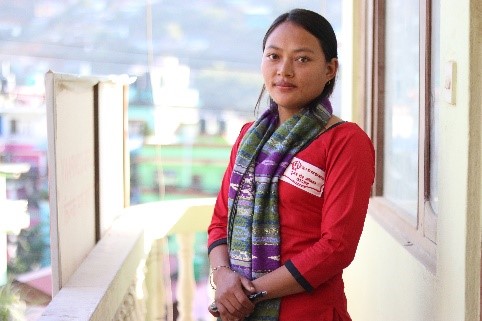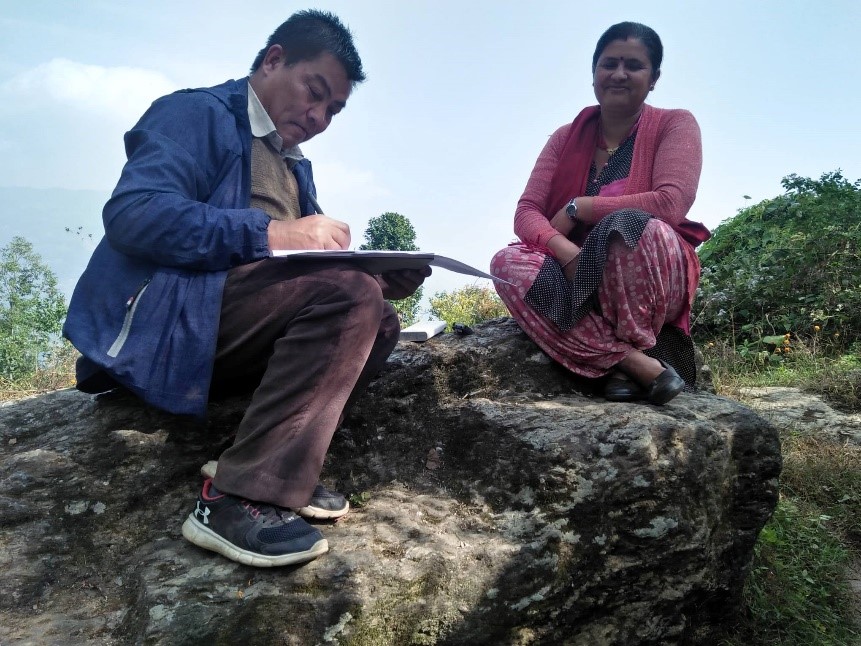Rural women engage their communities to improve health outcomes in Nepal
SHOPS Plus supports the Nepal CRS Company (CRS), a pioneer social marketing organization working in Nepal since 1978, to implement the USAID-supported Ghar Ghar Maa Swasthya project. As a part of this project, CRS leads the Remote Area Initiative, which promotes and creates demand for family planning, and maternal and child health services in rural communities. CRS implements this program in parts of four hill districts: Aghakhanchi, Ramechhap, Tanahu, and Terhathum. These are some of the most rural areas in Nepal and have extremely poor reproductive and child health indicators.
Bringing rural women together to promote health
To bring critical health messages to the hardest-to-reach areas of Nepal, CRS engages local women as community change agents. CRS trains the women to conduct health promotion activities and provides them with the knowledge necessary to answer a variety of health questions. Once trained, the community change agents meet with women’s groups across the country to discuss topics including the importance of antenatal check-ups and institutional delivery, health and hygiene, and family planning.
To illustrate the power of connecting women to other women to improve health outcomes, we are highlighting a community change agent and a beneficiary of the Remote Area Initiative program.

Anjeeta Sunuwar, a 23-year-old from Ramechhap, took on the role of community change agent as her first job. Since she started working with the Remote Area Initiative in July 2018, she has supported over 1,300 women through monthly women’s groups.
In discussing her training to become a community change agent, Anjeeta emphasized the importance of the leadership skills she developed alongside her growing understanding of priority health topics. This combination of practical health knowledge and group facilitation skills has empowered Anjeeta to make a meaningful impact in her community. She explains, “The community women are happy and they learn health programs… After the orientation in the community, I think family planning and ANC service is increased. So, I believe they have benefited [from] those programs.” After women’s group meetings, participants reach out to Anjeeta with additional health questions. Through the Remote Area Initiative, she has become a trusted health resource in her rural community, filling a critical gap.

Bal Kumari Adhikari, a 42-year-old farmer from Teharthum, first became interested in attending Remote Area Initiative meetings when she learned that a community change agent had formed a women’s group in her area. She has attended six of the meetings so far, noting that she found the family planning lessons especially valuable due to the large number of young married couples in her community. Of the Remote Area Initiative, she says “it definitely helps our family. We started to [do] water purification and know the family planning methods and maternal care in the family.” She hopes that the program will continue and expand its curriculum to address other health topics important to her community.
Rooting Critical Health Knowledge in Communities
As the Ghar Ghar Maa Swasthya project is set to close in spring 2020, community change agents are participating in Remote Area Initiative graduations in each of the four regions. As part of the graduation program, CRS recognizes these women as community health leaders equipped with the training needed to make a difference in Nepal’s most rural areas. To continue providing the women with the support needed to carry out their work and ensure rural communities can access health information, CRS is working with local governments to establish public ownership of the Remote Area Initiative. In this way, community change agents will be able to educate their communities long after the project ends.